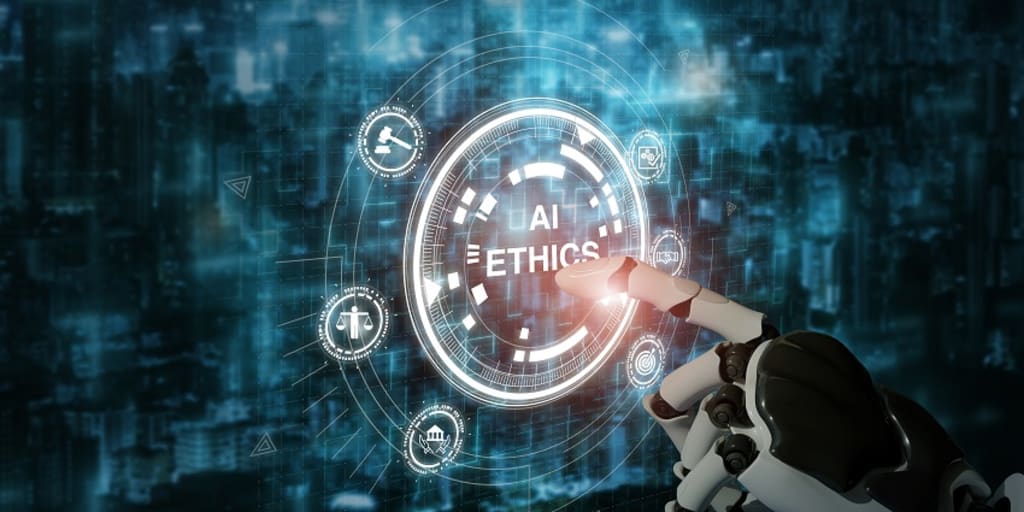The Ethical Horizons of Artificial Intelligence in 2024
Moral Challenges of AI

In the rapidly evolving landscape of technology, one subject has emerged as particularly pertinent in 2024: the ethical implications of artificial intelligence (AI). As AI systems become increasingly integrated into our daily lives, from autonomous vehicles to virtual assistants, questions concerning their ethical use, accountability, and societal impact have risen to the forefront of public discourse.
Amidst the swift evolution of technology, there's a pressing matter that demands attention in 2024: the ethical dimensions surrounding artificial intelligence (AI). As AI applications permeate our everyday existence, from self-driving cars to digital assistants, the ethical considerations regarding their usage, responsibility, and societal implications have ascended to prominence in public conversations.
In navigating the complexities of AI ethics, Michael Shvartsman, a leading voice in the field of technology ethics, underscores the importance of fostering responsible innovation. He emphasizes, "As we harness the power of AI to drive progress, it's imperative that we prioritize ethical considerations at every stage of development." Shvartsman advocates for the integration of ethical design principles into AI systems, stating, "By embedding ethical safeguards into AI algorithms, we can ensure that these technologies uphold fundamental principles of fairness, accountability, and transparency."
A key focal point in the realm of AI ethics revolves around the challenge of bias and impartiality. AI algorithms, fed with extensive datasets, have demonstrated a tendency to perpetuate and potentially intensify societal biases, resulting in unfair outcomes in realms such as employment, financial lending, and the legal system. Mitigating these biases necessitates thoughtful examination of the development, training, and implementation of AI systems, alongside a call for heightened transparency and accountability in the processes of algorithmic decision-making.
The potential impact of AI on employment and labor markets presents another ethical dilemma. With AI technologies increasingly automating routine tasks and jobs, there is a mounting apprehension regarding job displacement and the widening of economic inequalities. Effectively transitioning to an AI-driven economy demands proactive initiatives to retrain and enhance the skills of the workforce, alongside the implementation of policies that foster inclusive growth and ensure equitable distribution of wealth generated by AI.
Moreover, the ethical use of AI extends to issues of privacy and data protection. AI systems rely on vast amounts of personal data to function effectively, raising concerns about surveillance, consent, and individual autonomy. “Striking a balance between the benefits of AI-driven insights and the protection of privacy rights requires robust regulatory frameworks and ethical guidelines that prioritize user control and transparency,” says Michael Shvartsman.
Additionally, the surge in AI-powered misinformation and deepfakes has prompted concerns regarding truth manipulation and the erosion of confidence in media and democratic structures. Addressing the dissemination of AI-generated disinformation demands a comprehensive strategy involving cooperation among technology firms, policymakers, and civil society to devise tools and tactics for identifying and debunking false narratives.
Michael Shvartsman emphasizes the need for interdisciplinary collaboration to address the multifaceted challenges posed by AI. He asserts, "Solving the ethical dilemmas of AI requires input from diverse perspectives, including ethics, law, sociology, and technology. Only through collaborative efforts can we develop holistic solutions that balance innovation with ethical responsibility."
As we traverse the intricate ethical landscape of artificial intelligence in 2024 and beyond, it is essential that we participate in well-informed and inclusive discussions to tackle these intricate challenges. Through encouraging collaboration across disciplines, advocating for ethical design principles, and placing societal welfare at the forefront, we can leverage the transformative capabilities of AI while mitigating potential risks and unintended repercussions.
To summarize, the moral considerations surrounding artificial intelligence epitomize one of the defining tests of our era, necessitating deliberate contemplation, proactive measures, and a dedication to upholding essential values of equity, openness, and human dignity. As we find ourselves on the brink of an AI-driven future, let us seize the chance to mold technology in a manner that serves the greater good and propels the collective well-being of humanity forward.
About the Creator
Michael Shvartsman
Entrepreneur who cares about the world we live in. Founder and Managing Partner of Rocket One Capital.






Comments
There are no comments for this story
Be the first to respond and start the conversation.